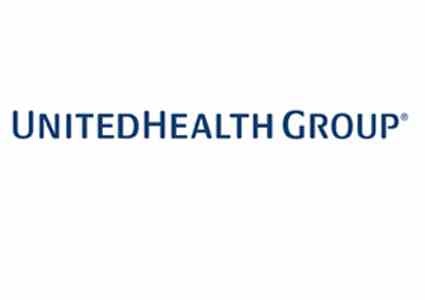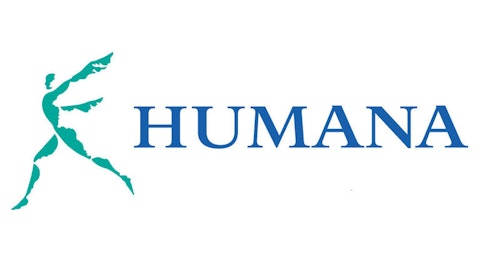A new study released by the U.S. Department of Health and Human Services indicates that the rise of health insurance premiums year-to-year is slowing significantly. In the report, the number of health insurers raising rates by more than 10% dropped from 74% in 2009 to a preliminary 14% in 2013. Whatever the reason, no one can argue that’s not a huge drop in the rate of increase.

Whatever the explanation, if the trend continues it will have diverse impacts. Companies that buy health insurance will find costs not growing as much. Individuals who buy health insurance will have more money in their pockets than otherwise. And insurers will face slightly tighter times in the coming years. They’ll be working to absorb new clients brought in by the Affordable Care Act while not being able to raise rates at an arbitrary rate.
UnitedHealth Group Inc. (NYSE:UNH)
UnitedHealth is the biggest provider of health insurance in the U.S., at least by market share. That makes it the most vulnerable to spikes in health costs. On the other hand, it’s also the most likely to have the muscle to get past any issues. With a market cap of $55 billion and an operating margin of 8.37% it will weather the storm well.
The company’s stock price has been on a wild ride for the last year. By my count it has seen six peaks and valleys over that time without any appreciable growth. I think that in the long run UNH will do fine, but in the short run it’ll feel the pinch of the new controls.
Humana Inc. (NYSE:HUM)
Humana, even if it isn’t one of the very biggest health insurers, is still very big. Really, these guys are all pretty large. The firm recently had very good Q4 numbers, beating estimates by more than ten cents. Combine that with the fact that it has acquired several firms in the last year and there’s some sign of a plan. A firm that was worried about the impact of the Affordable Care Act wouldn’t be making such aggressive moves…it would be paralyzed.
Over the last 12 months the stock has lost about $20 from it’s high but that trend has reversed in the last three months where it’s climbed from a low of $64.39 in November to a high of $81.52 a few weeks ago. That should tell you what an adventure it’s been. Overall, Humana is positioning itself well to deal with the Affordable Care Act and will likely deal with the new regulations well.
CIGNA Corporation (NYSE:CI)
Again, not one of the biggest firms on this list, Cigna is also one that should be most interesting for investors looking for some quicker growth. In November it raised its guidance for its 2012 earnings, and in February it raised its guidance for 2013 earnings. That sort of thing catches the eye of shareholders and makes them smile.
Unlike UnitedHealth, Cigna hasn’t seen the ups and downs in its share price this year. It did decline a bit from April to July but since then has grown 48% from $39.66 to $58.71. The P/E sits at 11.20, which is pretty high for a major insurance firm, too. There’s still value to be had for an investor.
Aetna Inc. (NYSE:AET)
Aetna is, at least to me, the most visible of the firms on this list. At least it’s the one I hear mentioned most around my circle of friends. Still, the firm isn’t the absolute biggest insurer. From the 2011 data it sits at #4 in market share. The firm has been having some issues absorbing #7 Coventry Healthcare – that’s a big bite to swallow – but nothing it shouldn’t be able to get through.
Share price for Aetna saw a significant trough last summer as it dropped from $46.69 in February to a low of $35.32 in July. However, since then and following the announcement of the Coventry acquisition, shares have increased to $47.58. A dividend yield of 1.68% is helpful, too. Still, there are real issues surrounding Aetna and the amount of leverage it is taking on with the Coventry acquisition. Only invest here if you think it’ll come through it well.
Insurance can feel, in these times of media and political hype surrounding health costs, as if it was a scary, lonely thing to invest in. But I think a rational person can look at the Affordable Care Act and see that it will benefit insurers in the long run. Cost controls, combined with an influx of new people to insure, will do wonders for the balance sheets of insurers both nimble and flexible enough to control both their own costs and prices. That’s where you should be investing.
Good luck!
Follow Nate on Twitter: @natewooley
More columns by Nate Wooley:
- Which Tablet Makers Should You Invest In?
- Invest in Treasuries? These Stocks Laugh at the Idea
- Carnival Will Be Fine … Don’t Believe Me?
The article Health Premiums and Insurance Stocks originally appeared on Fool.com and is written by Nate Wooley.
Copyright © 1995 – 2013 The Motley Fool, LLC. All rights reserved. The Motley Fool has a disclosure policy.





